Hearing aids
What types are there, and what can they do?
Benefits of hearing aids

About today’s hearing aids
They have sure come along way …
- Connect to your mobile phone, and answer and manage calls hands-free!
- Connect directly to your television so you can hear and stream your favourite show straight to your hearing aids
- Connect to GPS, the car radio, your favourite music, and so much more
- Have rechargeable batteries, meaning you can charge and go, just like your mobile phone, with no fiddly batteries to change
- Some models offer fall detection and fall alerts
- Can be waterproof and sweatproof
- Monitor heart, steps and other
- Can emphasise sounds coming from specific directions
- Differentiate types of sound and reduce background noise
- Can recognise a hearing environment and automatically adapts to the situations for the hearing aid wearer

Prescription fit
The right support is crucial
What makes for successful hearing?
Your motivation

The number one factor for success with using hearing aids is the need to be motivated. Hearing aids do not work if you are not motivated to wear them and to reap their benefits. Your independent hearing care professional (iHCP) will work with you to identify if you are ready for hearing aids and if you are going ahead with hearing aids for the right reasons, to ensure you are not wasting time or money. Hearing aids have the capacity to assist with your physical and emotional wellbeing and reduce the risk of cognitive decline.
Independent Hearing Care Professionals (iHCP) provide you with a thorough understanding of different hearing aids and to understand how the can support you in achieving your goals. The work that your Clinician does to fit, fine tune and program a hearing aid can make the greatest difference to the outcomes you experience. It is beneficial to seek out your local independent hearing clinic as they can provide you access to all brands, manufacturers, styles, and types of hearing aids available in Australia.
Independent audiology clinics carry a wide range of high quality and high-performance hearing aids across a number of technology levels and price ranges from a number of hearing aid manufacturers for you to trial and compare. Not all hearing clinics are independent! So be sure you ask!
Different styles
Hearing aids come in a number of styles which determine the size and where the hearing aid sits in your ear.
The smallest device is an invisible in the canal (IIC) device and then going larger there is a completely in the canal (CIC), in the canal (ITC), in the ear (ITE), receiver in the canal or in the ear (RIC/RITE) and behind the ear (BTE) hearings aids.
Your iHCP helps to evaluate what size hearing aid would be appropriate for your ear and your hearing loss.

